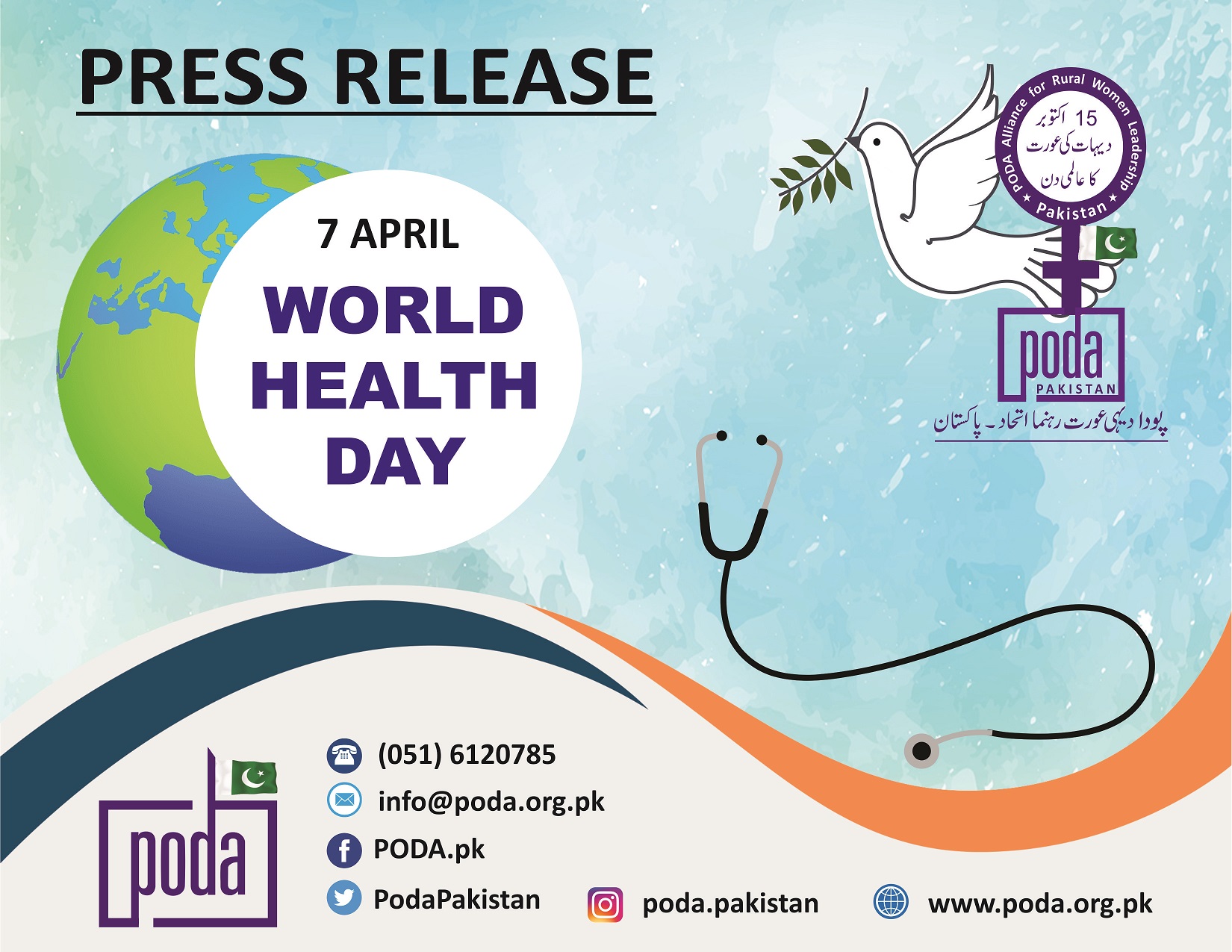
PODA (Potohar Organization for Development Advocacy) on the Occasion of World Health Day (Note: for information contact 03365119924)
Rawalpindi, Friday 7th April 2023: Celebrating World Health Day here in Rawalpindi today (Friday), Executive Director PODA said that the foundation of a society’s progress is its healthy citizenry. Speaking on the occasion, she urged the government to increase its annual per capita health budget from $39 to ensure all citizens’ access to quality health care especially rural women’s and adolescent girls’ access to quality reproductive health care,” said Sameena Nazir, Executive Director PODA-Pakistan.
Throughout the world every year World Health Day is celebrated on 7th of April. This year its 75th celebrations under the auspices of World Health Organization to ensure health for all to lead a healthy life, free of disease and discrimination ensuring basic health care facilities and services.
Executive Director – PODA suggested that prior to the construction of buildings for public health of all levels from basic to tertiary care, including hospitals, clinic and toilets in schools gender analysis must be considered in top priority list to address health care needs of women and girls. “We must not forget women and girl’s health and hygiene needs in Annual Development Plans (ADPs) at district level because a country’s well-being depends on healthy citizens”, said Sameena Nazir. She stressed the need to initiate a gender audit of all public building including, hospitals, basic health units and stadiums to make them accessible for persons-with-disabilities and wheel-chair-users.
Celebrating the day, PODA focused on the sexual and reproductive health rights of women and adolescent girls who are largely denied access their basic health and hygiene services, and rights and face barriers to get the most relevant information to improve their quality of life.
Ms. Afshan Tehseen, Child and Human Rights activist & Former Chairperson, National Commission on the Rights of Child (NCRC) said investing in health frees the government and communities from burden of unnecessary burden of disease
Dr. Rubina Fareed, Member National Commission on Rights of Children said that health is wealth and women and girls have the right on this wealth that comes through their inclusion in all policies and access to information – that serves as lifeline in this age of information.
“There is no specific provision regarding Right to Health in the constitution of Pakistan. It is our dire need to include Right to Health provisions especially for women and girls in the constitution of Pakistan”, said Advocate Khawaja Zahid, Legal Expert-PODA.
Ms. Nabeela Aslam, PODA shared an overview of PODA’s project, “Reducing Early Marriages to Enhance Gender Equality”, supported by the Royal Norwegian Embassy in Pakistan. “Early marriages are violation of a girl child’s basic rights to lead violence and abuse free life. This leads to physical, mental and emotional forms of violence which can be prevented by amending the Child Marriage Restraint Act 2015 – Punjab to raise minimum age of marriage of a girl from 16 to 18 years of age,” she added.
Considering the access to SRHR information a fundamental right, the speakers were of the view that access to health care facilities for quality sexual and reproductive health needs is a basic right of women and adolescent girls, while guaranteeing this right is foremost duty of the government. It is linked with other rights including right to lead a healthy life, free of disease and discrimination and right to education as well. Fulfillment of these rights contributes to overall progress of the society reducing disease burden and ending poverty. The speakers urged the government that with the support of civil society organizations barriers in accessing sexual and reproductive health information and facilities could be removed which negatively impact lives of women and adolescent girls.
JUGNI Theatre Group – Chakwal also presented a play raising awareness on the law regarding early marriages in Pakistan while emphasizing the effective role of Nikkah-khawans in implementing the law to stop this violation of human rights of a girl child. Pakistan’s Child Marriage Restraint Act 1929 sets the legal age of marriage for boys to 18 and 16 for girls. In April 2014, the Sindh Assembly adopted the Sindh Child Marriage Restraint Act, which changed the minimum age to 18 for both girls and boys, punishable by law.
PODA organized World Health Day “Health for All: SRHR For Women and Girls in Pakistan” in which a large number of people representing all walks of life including university students, health workers, media persons, health experts, lawyers, teachers, councilors, lady health workers and women representing rural communities participated.
According to The World Bank survey (2017), Pakistan is placed in the top 10 countries in the world with the highest number of deaths due to maternity. Fertility rate in adolescent girls in Pakistan is one of the highest in the world. Pakistan is the 3rd country with highest burden of maternal, fetal and child mortality globally. Many of these pregnancies are due to a severe lack of accurate information and access to sexual and reproductive health services. Teenage pregnancy substantially impacts a girl’s education, health and future prospects, putting her at risk of poverty and exclusion. # ENDS
